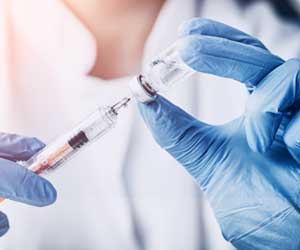- A newly formulated heat-stable injectable polio vaccine has been developed
- Using freeze-drying helps stabilize the vaccine and increase its shelf-life
- The new polio vaccine could help in the global effort to eradicate polio from the face of the Earth
The study has been published in mBio, a journal of the American Society for Microbiology (ASM).
The Principal Investigator of the study was Dr. Jae U. Jung, PhD, Distinguished Professor and Chair of the Department of Molecular Microbiology and Immunology at the Keck School of Medicine, USC.
Dr. Woo-Jin Shin, PhD, a post-doctoral fellow in Jung’s lab and the study’s lead author, said: “Stabilization is not rocket science, so most academics don’t pay much attention to this field.” He added: “However, no matter how wonderful a drug or vaccine is, if it isn’t stable enough to be transported, it doesn’t do anyone much good.”
Besides Shin, other co-authors included Daiki Hara and Jae Jung of the Keck School of Medicine, and Francisca Gbormittah, Hana Chang and Byeong S. Chang of Integrity Bio Inc., located in Camarillo, California. Integrity Bio specializes in developing drug and vaccine formulations, stability testing, and lyophilization, amongst others.
Read More..
Polio & Polio Vaccines
- Polio: Also known as poliomyelitis, this is a highly infectious viral disease caused by the polio virus. The virus commonly attacks children younger than five years of age and can cause life-long paralysis. Polio is on the verge of eradication and is currently only present in three countries, namely, Nigeria, Afghanistan, and Pakistan. Only 22 cases of polio were reported worldwide in 2017. However, recently, a few cases have been reported from Nigeria, Pakistan, Papua New Guinea, and Syria. There is no cure for polio, but it can be prevented by vaccination.
- Polio Vaccines: There are two types of polio vaccines. The oral polio vaccine was developed by Dr. Albert Sabin and is being used for the polio eradication drive across the globe. The other vaccine, developed by Dr. Jonas Salk, is the injectable polio vaccine. In the last stage of the polio eradication campaign, the vaccination strategy is shifting from the oral to the injectable polio vaccine.
Freeze-Drying & Its Applications
Freeze-drying, also known as lyophilization or cryodesiccation, is a process used for removing water from biological samples such as vaccines. This process involves freezing the material, followed by reducing the pressure, then increasing the temperature to allow the frozen water to sublimate. Freeze-drying converts the material into powder form, which makes it heat-stable and increases the self-life.Freeze-drying has been successful in producing heat-stable typhoid, measles and meningococcal vaccines, but has failed to produce a heat-stable polio vaccine, until now.
Shin and his co-workers used lab techniques like liquid chromatography and high-throughput screening (HTS) to screen a huge number of samples and formulations to find the right one that was most suitable. Freeze-drying contributed significantly to make the vaccine formulation heat-stable.
What is the Importance of the Study?
The importance of the study lies in the fact that the stability of the polio vaccine has been increased appreciably by the method used by Jung’s group. This increased vaccine stability means that the vaccine can be transported to remote areas where refrigeration facilities are not available. This will dramatically increase the availability of the vaccine in hitherto unreached parts of the globe.Future Plans
The researchers plan to take the vaccine forward to human studies. Jung is hopeful that a foundation or company will provide funding to carry out these human clinical trials and help to bring the newly formulated injectable polio vaccine onto the market.Reference:
- Development of Thermostable Lyophilized Sabin Inactivated Poliovirus Vaccine - (https://mbio.asm.org/content/9/6/e02287-18)
Source-Medindia













